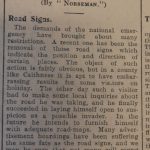The second phase of the Battle of Britain began on Thursday 8 August, when German aircraft switched to raids on shipping, coastal airfields and radar stations south of London, although they were unable to knock out Britain’s radar warning systems. Plans to destroy the RAF’s planes and command structure (codenamed Adlertag or “Eagle Day”) had to be postponed because of bad weather. Meanwhile, the USSR continued to expand its borders, annexing Latvia and Estonia. In Somaliland, British forces withdrew after fighting with the Italian invaders.
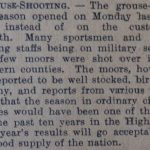
The John O’Groat Journal this week reported that the grouse-shooting season had started a week earlier than usual, instead of on the “Glorious Twelfth”; but because of “many sportsmen and gamekeeping staffs being on military service, very few moors were shot.”
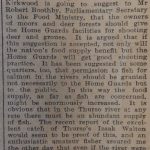
A novel solution was proposed to deal with the situation: “The owners of moors and deer forests should give the Home Guard facilities for shooting deer and grouse”. Not only would this provide food in a time of scarcity, but it would also give the Home Guard valuable target practice!
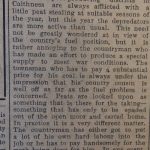 Although petrol had been rationed at the start of the war, fuel for heating had not. Coal wouldn’t be rationed until July 1941, and gas and electricity the following year. But even if it wasn’t rationed, fuel could still be hard to come by and the John O’Groat Journal reported that, as a result, theft of peat was on the increase: “Peats are looked upon as something that is there for the taking”, when in fact the countryman has had to work hard for it. “In any event, it is exasperating to find that the peat-thief is away with some of his hard-won fuel.”
Although petrol had been rationed at the start of the war, fuel for heating had not. Coal wouldn’t be rationed until July 1941, and gas and electricity the following year. But even if it wasn’t rationed, fuel could still be hard to come by and the John O’Groat Journal reported that, as a result, theft of peat was on the increase: “Peats are looked upon as something that is there for the taking”, when in fact the countryman has had to work hard for it. “In any event, it is exasperating to find that the peat-thief is away with some of his hard-won fuel.”
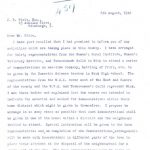 Meanwhile, the Director of Education was planning “a series of demonstrations on war-time
Meanwhile, the Director of Education was planning “a series of demonstrations on war-time cookery, bottling of fruit, etc.” by the Domestic Science teacher of Wick High School. The demonstrations were intended for some 30 representatives of the Women’s Rural Institute, Women’s Voluntary Service, and Townswomen’s Guild in Wick, and they would then in turn replicate them for their own members.
cookery, bottling of fruit, etc.” by the Domestic Science teacher of Wick High School. The demonstrations were intended for some 30 representatives of the Women’s Rural Institute, Women’s Voluntary Service, and Townswomen’s Guild in Wick, and they would then in turn replicate them for their own members.
Finally this week, the John O’Groat Journal considered the consequences to visitors of removing all road signs to hinder a German invasion. “The other day such a visitor had to make some local inquiries about the road he was taking, and he finally succeeded in laying himself open to suspicion as a possible invader.” On the other hand, the journalist concluded, it wasn’t all bad: “many advertisement hoardings have been suffering the same fate as the road signs … and it cannot be said that they added to the beauty of the countryside.”